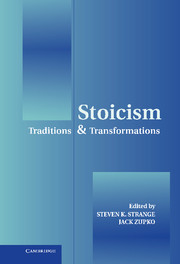Book contents
- Frontmatter
- Contents
- List of Contributors
- Acknowledgments
- List of Abbreviations
- Stoicism
- Introduction
- 1 The Socratic Imprint on Epictetus' Philosophy
- 2 The Stoics on the Voluntariness of the Passions
- 3 Stoicism in the Apostle Paul: A Philosophical Reading
- 4 Moral Judgment in Seneca
- 5 Stoic First Movements in Christianity
- 6 Where Were the Stoics in the Late Middle Ages?
- 7 Abelard's Stoicism and Its Consequences
- 8 Constancy and Coherence
- 9 On the Happy Life: Descartes vis-à-vis Seneca
- 10 Psychotherapy and Moral Perfection: Spinoza and the Stoics on the Prospect of Happiness
- 11 Duties of Justice, Duties of Material Aid: Cicero's Problematic Legacy
- 12 Stoic Emotion
- Works Cited
- Name Index
- Subject Index
9 - On the Happy Life: Descartes vis-à-vis Seneca
Published online by Cambridge University Press: 11 July 2009
- Frontmatter
- Contents
- List of Contributors
- Acknowledgments
- List of Abbreviations
- Stoicism
- Introduction
- 1 The Socratic Imprint on Epictetus' Philosophy
- 2 The Stoics on the Voluntariness of the Passions
- 3 Stoicism in the Apostle Paul: A Philosophical Reading
- 4 Moral Judgment in Seneca
- 5 Stoic First Movements in Christianity
- 6 Where Were the Stoics in the Late Middle Ages?
- 7 Abelard's Stoicism and Its Consequences
- 8 Constancy and Coherence
- 9 On the Happy Life: Descartes vis-à-vis Seneca
- 10 Psychotherapy and Moral Perfection: Spinoza and the Stoics on the Prospect of Happiness
- 11 Duties of Justice, Duties of Material Aid: Cicero's Problematic Legacy
- 12 Stoic Emotion
- Works Cited
- Name Index
- Subject Index
Summary
Descartes wrote little in the way of moral philosophy, but he regarded the topic as of the utmost importance. As he describes it in the preface to the French edition of his Principles of Philosophy, the uppermost branch of the tree of philosophy is occupied by la morale, “the highest and most perfect moral system, which presupposes a complete knowledge of the other sciences and is the ultimate level of wisdom” (AT IXB 14/CSM I 186). This moral system would be more than just the final element of Descartes' philosophy; it also defines the end, or telos, of his ordered reconstruction of knowledge. In an important sense, the prior, theoretical parts of his philosophy are established for the sake of the practical benefits that follow from them. To those skeptical about what philosophy has to offer, Descartes confidently replies that the difference between his principles and those of other philosophers, “as well as the long chain of truths that can be deduced from them, will finally make them realize how important it is to continue in the search for these truths, and to what a high level of wisdom, and to what perfection and felicity of life, these truths can bring us” (AT IXB 20/CSM I 190).
Descartes is usually seen as the quintessential modern philosopher, yet in his broader conception of philosophy's goal we find repeated a central ancient theme: philosophical knowledge is valued not only for its own sake, but as the basis of the best sort of human life – one in which we realize the greatest perfection and happiness.
- Type
- Chapter
- Information
- StoicismTraditions and Transformations, pp. 177 - 197Publisher: Cambridge University PressPrint publication year: 2004
- 16
- Cited by



